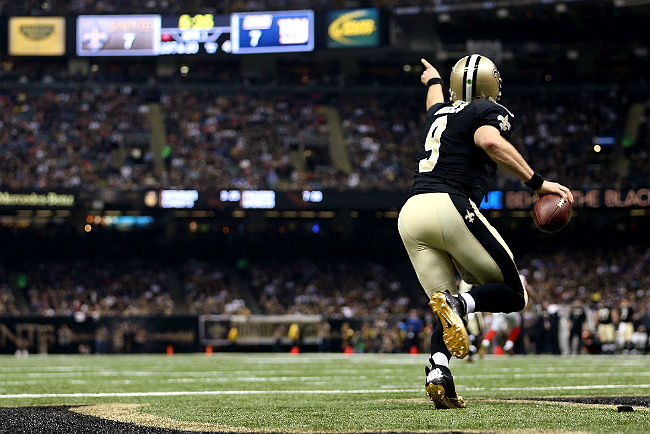
There’s a very healthy way to view football, one that makes for a well-adjusted and even-keeled life, and that’s to give in to the sheer unpredictability of it all. You can see the analytics and know the tendencies and say that this offense is more susceptible to this kind of defensive scheme, but it’s never 100 percent and we continually act shocked when the improbable bleeds into our reality. This happens all the time in football, and what can we really do about it? We can give into its charms and let the madness take us where it wants. Ceding control can be liberating, and it throws projectiles at your high-def set.
And so once in a while, we get something like Sunday’s battle between the Saints and Giants, a game in which it appeared that both defenses were mistakenly set to sleep mode. But no one knew that. You want to believe that you could see a 101-point game coming. Maybe someone’s missing multiple members of its secondary. The other team’s got a running back who looks like 20-year-old Barry Sanders ripping a hole through the Big 8 way back when. Usually, the signs are there, but nothing prepares you for the third-highest scoring game in the history of the NFL. This was as close as one gets to football as chaos theory.
But this kind of football also took on air of inevitability. Usually in sports, the inevitability only shows up when something bad is about to happen. We can feel the sports god of whimsy casting his eye in our general direction and muttering under his breath, “Yep, it’s your turn now.” This was not quite that, though. There were 14 touchdowns scored in this game, 13 of which were on offense. That means drives, that means plays with a certain sequential rhythm. You see the touchdown on the assembly line in mid-development. And then there’s a finished product — Drew Brees taking the flea-flicker and going 34 yards to Willie Snead, or Eli Manning throwing 50 yards to Odell Beckham Jr. to open the second half — but there’s another and another and another. Usually, they stop coming. And sometimes, like on this day in New Orleans, they don’t.
Being that there have only been two games ever played that resulted in more points than this, let’s take a moment to appreciate the sheer numerical zaniness of this particular box score. First, the Giants, who saw Manning find the end zone six times and blow by both Joe Montana and Vinny Testaverde for No. 10 in all-time TD passes. In his hometown, Eli threw for 350 yards, didn’t turn the ball over, and gave the Giants every conceivable chance to win and move to 5-3. Manning’s throws were confident, and he always found his receivers where he needed them. Dwayne Harris, who had four career receiving TDs over five seasons, scored twice against New Orleans, both times as part of the Giants’ furious fourth-quarter comeback.
But it was a comeback doomed to fail because Drew Brees was superhuman on this day. A nice round 40-of-50 passing, Brees tossed seven scores to five different players, and these passes that he was making all day were not of the just-throw-where-the-defenders-aren’t variety. These were tough, tight passes that were snaking around and through defenders’ arms, courtesy of desperate scrambles and into coverage areas where no footballs had any business. I’m ever more convinced that the most elite athletes do what they do because they know enough not to overthink in the moment, because that invites second-guessing and doubt. What Brees does at his best is not something that can likely be taught. It is instinctual; it is primal. You don’t get to throw the fifth-most TD passes of all-time by scripting ‘em all out. As through most of his career, Brees against the Giants was a player daring a defense to do better than him. That rarely ever works out for the defense.
And so it was that the Giants ran out of time. After a pick-six of Brees — finally, a defense did something! — with 7:11 left, the Saints took the ball and ground out every second they could. When Brees found C.J. Spiller for a nine-yard score with 36 seconds to tie the game at 49-49, overtime was imminent. Ah, but then the unpredictability set in again. The scoring would surely continue, but how? Incredibly, the Giants had to punt away, and punter Brad Wing was called for a face mask penalty on the return. That put the Saints in position to kick a 50-yard field goal with five seconds left.
That’s how you get 52-49 in regulation. It could’ve been, at the most, 58-52, in overtime — with both teams trading field goals on their initial possessions and then someone scoring a touchdown — but that would’ve been perhaps the most logical outcome given the first 59 minutes and 55 seconds. And this was not a game that dealt in rationalities.
This is the kind of game that fans will remember for years, because everyone played well, and what ultimately came to pass only did so because there was a finite amount of time on the clock, and a kooky set of circumstances allowed one team to inch ahead when the other could not. If we knew something like 52-49 was coming, I don’t know if it would really be any less fun, but the not-knowing is what makes it all worthwhile.






